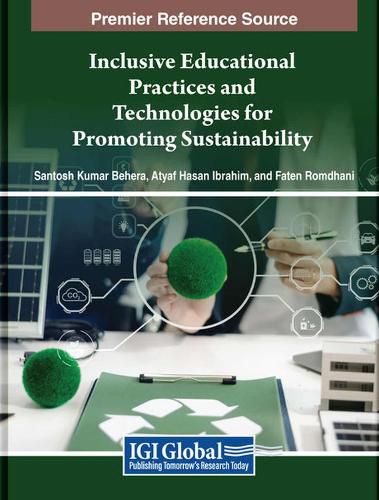Inclusive Educational Practices and Technologies for Promoting Sustainability

Inclusive Educational Practices and Technologies for Promoting Sustainability
This title is printed to order. This book may have been self-published. If so, we cannot guarantee the quality of the content. In the main most books will have gone through the editing process however some may not. We therefore suggest that you be aware of this before ordering this book. If in doubt check either the author or publisher’s details as we are unable to accept any returns unless they are faulty. Please contact us if you have any questions.
In today's rapidly evolving world, the digital learning gap presents a significant challenge, impacting the effectiveness of education and the development of essential skills for future generations. Traditional teaching methods often fail to meet students' diverse needs, leading to a skills gap between current and future workers. Additionally, the ambiguity in defining concepts such as the "heap paradox" and the inadequacies of traditional economic measures like GDP highlights the need for more nuanced and comprehensive approaches to education, environmental psychology, and sustainable development. Inclusive Educational Practices and Technologies for Promoting Sustainability offers a multifaceted solution to these pressing issues by exploring the transformative potential of Educational Technology (EdTech), the insights of environmental psychology, and the importance of holistic measures of human welfare. By showcasing how EdTech can bridge the digital learning gap, enabling teachers to employ diverse strategies and better meet students' needs, we demonstrate its potential to revolutionize education and support the growth of the next generation. The book also delves into the paradox of the heap, where logic, vagueness, and philosophy complicate our methods of thinking. It illustrates the complexities of everyday concepts and their relevance to environmental psychology while advocating for a deeper understanding of the human-nature relationship. Furthermore, the book examines sustainable development through a comparative analysis of GDP and the OECD's Better Life Index (BLI), statistically verifying whether GDP's focus on income inadequately reflects true human welfare. This analysis underscores the need for more holistic measures of development that capture the multifaceted nature of human well-being. By integrating these diverse yet interconnected topics, the book provides a comprehensive resource for academic scholars, offering innovative solutions that can be practically applied to enhance education, promote environmental stewardship, and ensure sustainable development.
This item is not currently in-stock. It can be ordered online and is expected to ship in 7-14 days
Our stock data is updated periodically, and availability may change throughout the day for in-demand items. Please call the relevant shop for the most current stock information. Prices are subject to change without notice.
Sign in or become a Readings Member to add this title to a wishlist.


